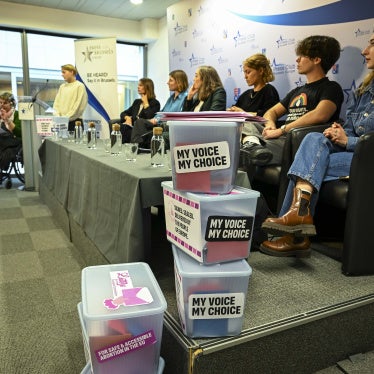In recent months there have been a few positive human rights developments in the region, including notably in Uzbekistan the release from prison of a half-dozen wrongfully detained human rights defenders and an agreement granting ICRC access to prisons. While these developments are to be welcomed, they should not eclipse the overall abysmal state of human rights in the country, and indeed in the region as a whole.
The need to send an unequivocal message about the centrality of human rights to EU policy is all the more important given these governments’ reluctance to engage in structured human rights dialogues with the EU, as foreseen in the EU Central Asia Strategy. It will be crucial in your meetings to stress that human rights will always be a key element in the EU’s relationship with each government, and that human rights concerns will be raised at every opportunity and at all levels, whether in a structured dialogue or not.
The EU Central Asia Strategy will no doubt be a key focus of discussions not only at the foreign ministerial troika meeting in Ashgabat but also in your meetings with the governments of the region throughout your trip. We believe the strategy has a real potential to advance human rights in the region. Adhering to three principles can help the EU maximize this potential: (1) establishing clear human rights benchmarks for each country and linking progress on these benchmarks as an incentive to future benefits; (2) consulting broadly with civil society in the region on the implementation of the strategy and reflecting this input in future reviews of the strategy; and (3) providing timely and regular public information on the achievements of the strategy.
The enclosed briefing paper elaborates on these principles, provides a brief overview of key human rights problems in each Central Asian country, and proposes benchmarks that we hope to see the EU advance as part of its engagement with these countries.
We hope you will raise the substantive problems highlighted in the paper with the relevant governments during your trip. We hope you will strike the right balance between welcoming some positive steps these governments have taken and expressing concern about serious outstanding problems that need to be addressed.
We further hope that you will meet with civil society representatives in each country, both to inform your assessment, and to mark your support for their important work.
In Kazakhstan, we hope you will express concern to the country’s leadership that it has made little if any progress toward fulfilling the promises of reform Foreign Minister Tazhin made at the Madrid foreign ministers’ summit of the Organization for Security and Cooperation in Europe last December. The Kazakh government’s credibility is on the line. But so too is the credibility of the EU, since it endorsed Kazakhstan’s OSCE chairmanship bid despite the government’s obvious failures to adhere to OSCE human dimension commitments.
In Uzbekistan, the government has in the past six months released and/or amnestied from prison eight individuals who had been unjustly imprisoned in the crackdown that followed the 2005 Andijan uprising and massacre. The government also introduced habeas corpus and abolished the death penalty. These are obviously welcome developments, resulting in no small measure from sustained EU engagement with the Uzbek government, including the dynamic created by the sanctions adopted by the EU in the wake of the Andijan massacre. But Uzbekistan remains one of the most repressive states in the Central Asia region, and consistent, principled EU engagement is essential to ensure positive change in the areas outlined in the enclosed briefing paper. In your meetings in Tashkent we urge you to call on the government to immediately and unconditionally release all human rights defenders who continue to serve politically motivated prison sentences—numbering at least 12 as of this writing—and to make clear that the EU sanctions will remain firmly in place until this and the other criteria set by the EU are met.
In Turkmenistan, the government has taken a few dramatic steps to reverse some of the most destructive social policies of the Niazov era and to end the country’s international isolation. The importance of these steps should not be minimized. But they must be seen as more a reflection of the government’s utterly abysmal human rights record under Niazov than on the government’s future direction in human rights. Altogether Turkmenistan remains one of the most repressive and authoritarian in the world.
Your meeting in Ashgabat will have important symbolism, as it is among the most high-level EU gatherings ever to have taken place in Turkmenistan. The government may well use the meeting as evidence that the EU approves not only of recent positive steps but of the government’s overall direction in human rights. This would be a terrible blow to the courageous individuals in Turkmenistan who strive, in the face of tremendous adversity, to call attention to the country’s human rights problems. And it would serve as a disincentive to the government for further needed change. We therefore hope you will emphasize your profound concern about continued repression in the country and the necessity for urgent reform steps that need to be taken. In particular, we hope you will call for the government to immediately release three well-known political prisoners—Mukhametkuly Aymuratov, Annakurban Amanklychev, and Sapurdurdy Khajiev. We also ask that you call on the government to allow the registration and free functioning of independent civil society groups and to end excessive government control over people’s right to travel abroad.
Emphasizing these points builds on the momentum already created by previous steps taken by the government and is also consistent with the benchmarks adopted by the European Parliament in 2006 and reaffirmed in February 2008.
In Kyrgyzstan, we hope you will flag concern about declining pluralism and urge the government to annul an ordinance issued by the Bishkek municipal government that unreasonably restricts freedom of assembly. We also ask that you call on the government to take measures to enforce laws on domestic violence and bride-kidnapping. A first step in this direction would be for the government to reinstate the position of the Special Representative of the President for Gender Issues and to give it adequate authority and mandate to ensure the enforcement of these laws.
In Tajikistan, we hope you will call on the government to implement OSCE recommendations on carrying out trials, emphasizing the need to investigate all allegations of torture and implement the recommendations to the Tajik government issued in November 2006 by the Committee Against Torture. We also hope you will raise concern about the new law on public associations that grants the government excessive powers to monitor and restrict nongovernmental activity.
We hope you will find the points highlighted in this letter and the enclosed briefing paper useful. We would welcome the opportunity to provide you or your staff with any further information or clarifications, should you find it helpful.
With best wishes for a productive trip.
Sincerely,
Holly Cartner
Executive Director
Europe and Central Asia Division
Jean-Marie Fardeau
Director
Paris Office








